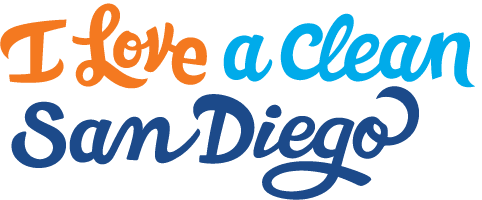Tips and tricks for easy organic waste recycling
SAN DIEGO COUNTY (June, 2024) – With the Summer season upon us, I Love A Clean San Diego (ILACSD) and the County of San Diego provide tips on recycling your organic waste, including how to keep your green bin odor and pest-free.
According to the County’s Department of Public Works, about 40% of the waste in our landfills is organic waste, which includes food waste, food-soiled paper, and yard trimmings. When organic waste decomposes in a landfill, without the presence of oxygen, methane is produced, a potent greenhouse gas and driver of global climate change. Fortunately, “organic waste” is not waste at all; these organic materials can be composted to create a valuable soil amendment that increases moisture retention, helps with erosion control and builds healthy soil.
As of January 1, 2024, Senate Bill 1383 now requires all residents and businesses to recycle their organic waste. In addition, all San Diego residents and businesses now have access to an organic waste (green) bin, to separate organic waste from trash and other recyclables. This helps San Diego save space in our landfills and meet climate action goals
“Recycling organic waste is one of the easiest things we can do to conserve our natural environment,” says Steve Weihe, Recycling Specialists II, at the County of San Diego. “The methane produced from organic waste sitting in landfills is a significant contributor to climate change, but when organic waste is managed properly and turned into compost, it has a positive environmental impact.”
Organic Waste Recycling – What Goes in the Green Bin?
Organic Waste includes:
- Food scraps (fruits, vegetables, meat, bones, dairy, eggshells, breads, coffee grounds, grains and prepared foods, moldy and spoiled food)
- Food and liquid soiled paper (napkins, paper towels (not if used with cleaning agent), paper tea bags, paper plates, paper coffee filters, paper take-out containers, and greasy pizza boxes)
- Yard trimmings (leaves, grass clippings, tree roots, flowers, branches, lumber, unpainted and untreated wood)
DO NOT include:
- “Compostable” or “biodegradable” marked plastics, including: bin liners, produce bags, dishware, and more
- Pet waste or kitty litter
- Dirt, rocks, concrete, or soil
- Liquids
- Other inorganic material, including plastics, glass, and metals.
Tips for a pest-free and odor-free green bin:
Again, with Summer upon us, some residents may be concerned about possible smells and potential pests in the green bin that may arise. Follow these tips to ensure that your green bin stays clean and odor-free:
- Collect food scraps in a smaller container before emptying them into your green bin. Some waste haulers offer free kitchen countertop containers- reach out to your waste hauler if you don’t have one already.
- Empty your food scraps container into your green bin the night before collection. This is the BEST solution to help prevent pest and odor issues.
- Keep your food scraps in the freezer or fridge
- Wrap your scraps- use a paper towel, paper bag or newspaper to wrap your food scraps
- Put yard waste at the bottom of your green bin to soak up extra moisture from food scraps. From there, alternate food scraps and yard waste to ensure a healthy and odor-free mix.
- Add a bit of baking soda to your food scraps to help combat potential odors.
- Rinse and dry your green waste bin periodically to prevent residue buildup.
Following these tips will help to ensure an easy transition to organic waste recycling. You can also find recycling guides on the County’s website and learn about sustainable practices by registering for one of I Love A Clean San Diego’s workshops and webinars at cleansd.org/events.
About I Love A Clean San Diego
Celebrating 70 years in 2024, I Love A Clean San Diego (ILACSD) is an environmental nonprofit supporting residents and businesses of San Diego County. ILACSD was founded in 1954 as the San Diego War Against Litter Committee (WALC), in the 1970s, “I Love A Clean San Diego” became the slogan for the organization’s anti-litter campaign, and in 1980, it became the organization’s name. Over the last seven decades, ILACSD has since evolved into the nonprofit it is today, providing programs that go far beyond litter cleanups and serve as environmental catalysts. Our programs inspire and empower San Diegans to be environmental and waste-free living leaders in their communities. For more information or to volunteer, visit CleanSD.org or call (619) 291-0103. Connect with us on Facebook, Twitter, Instagram and LinkedIn.

